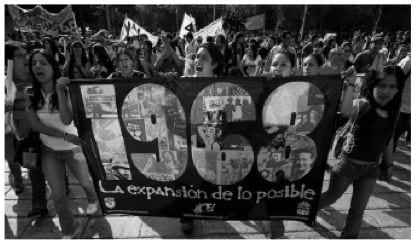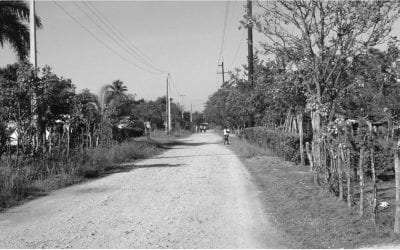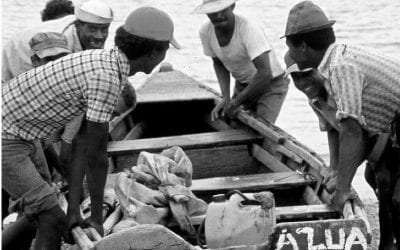Revolution by Osmosis
A 60s Remembrance
I grew up in the peaceful paradise of Costa Rica. I can picture myself as a 13-year-old in 1960, a rebellious teenager with little self-esteem growing up in the exuberant tropical landscape surrounded by mountains, volcanoes and the sea.
The big commotions of the 1960s that would shake the world did not reach us. The first tremors that heralded in the Cuban revolution, student movements, Vietnam and the feminist movement never quite made it to Costa Rica. Life was uneventful, save for my secret longings and romantic visions. And I had no other ambition than to desperately want to escape from that paradise that felt suffocating to me without my really knowing why.
I remember myself at the very beginning of the 60s. I don’t fit in: I am Jewish, living in a small community of about 250 families that have come mainly from Poland, most of whom are Holocaust survivors. Many have numbers tattooed on their forearms. I try not to look but I can’t keep my eyes off their arms. My father loves the country and has been the community leader for more than 20 years. My Lithuanian mother, on the other hand, is not happy in Costa Rica. She cannot find many friends among these Polish and Gallitzian Jews who speak what she considers a vulgar form of Yiddish. She wants to move to New York where her sister lives.
The visit of U.S. President John F. Kennedy to Costa Rica changed the routine and gave me a glimpse of glamour and excitement.
The day was unforgettable. I put on mascara for the very first time in my life and went out with my classmates to welcome the president. Costa Rica was proud of not having an army. Since there were no soldiers, the government recruited all the high school students to form a gauntlet stretching from the airport up Central Avenue and all the way to the university on the other side of the city, the route President Kennedy’s car would take.
Suddenly we saw the car coming. My eyes started to itch. I regretted the use of mascara on such an important day. Kennedy drove by very close in a convertible. I was impressed by his red hair. “Oh, how handsome,” I thought. I noticed his eyes were very irritated. Then I then realized we all had red eyes. It was not till later that we found out that the Irazú volcano had begun to erupt, covering the whole country with volcanic ash. For the next two years it rained ashes. People walked around with umbrellas. Houses had to be cleaned three and four times a day. But the ashes were great for teasing hair into very puffy forms to create tall beehives with flips at the ends that everybody wore.
Together with Kennedy, mascara and beehives, the Beatles came into my life with their romantic plea, “I want to hold your hand.” They coexisted with my other idol, Elvis Presley, rather than entirely replacing him. And they did not do away with my fondness for the mainly Mexican boleros (love songs) I listened to on the radio, music I still love today.
Fast forward to 1965. I have decided to study psychology at the National University of Mexico. Free at last, I am dazzled by the university. In the Humanities Department where I study psychology, I enjoy my new-found freedom. I forget, even if only for a short time, the social demands of what is expected of me, of all of us women: marriage. Instead, I concentrate on my new life full of ideological discussions, film debates, political rallies and my first student strike.
The student demands of 1966 sounded right to me, particularly because that was what my new friends thought: abolish the entrance exam, ban the university police and overhaul the university programs. The shameful outcome of this strike was when a group of law students took over the dean’s office and forced Dean Ignacio Chávez to resign at gunpoint after humiliating him in various ways. The new dean, Ignacio Barros Sierra, complies and eliminates the entrance exam for students of the national high school system, gets rid of the university police and everybody starts working on the new curricula.
When I arrived in Mexico, there was only one political party that mattered: the PRI (Partido Revolucionario Institucional). Everything was decided and managed by the PRI: the elections, the unions, and the three social sectors of the working class, the peasants and the popular class. The PRI monitored everything: the press, radio, TV, film. The obsession with political stability of the Mexican state started to suffocate everybody. At the university, discussions on academic reform were gradually replaced by calls for the release of some political prisoners. In the large cafeteria in the Humanities Department, everything was discussed: the civil rights movement in the United States, Malcolm X, Ché Guevara, the Cuban Revolution, the war in Vietnam. There was the Communist group, the Maoists, the Spartacus League, the foquistas (Ché sympathizers); we all agreed on liberty, justice, the end of the bourgeoisie, doing away with everything we learnt from our parents, overstepping limits, experimenting with sex, drugs and the contraceptive pill; we decided that the Vietnam war was bad, that you had to support the Cuban Revolution, and that the CIA was to blame for everything. We all had to achieve our financial independence, travel on our own, go to Europe and sing protest songs.
By 1968, some of my friends were faculty representatives on the National Strike Committee. I supported them completely but participated from the sidelines.
Being a foreign student I was scared to be thrown out of the country for “meddling in national politics,” as they put it. The government blamed “exotic foreign ideas” for the movement and was on the look-out for foreign scapegoats. Deep down, this suited me just fine. I was too fearful to be a militant or to commit politically to any group. So I engaged in low-profile activities. I was very good at using the mimeograph so I printed out hundreds and hundreds of copies of flyers for others to hand out. I went to all the marches and all the political meetings. To raise funds I organized the Queen of the University election with my fellow student Carlos Sevilla. We walked all around campus while Carlos picked out the girls he fancied to be Queen candidates. They then had to go and sell votes for their own election. The winner was going to be crowned on September 15 during the Mexican Independence celebration. The pageant was a huge success and raised a lot of money for the cause.
I imagine the government started to lose patience with this effervescence. At first it didn’t care about the few Maoists in Political Science or the small group of Trotskyites in Economics or the Ché Guevaristas in Philosophy. But these high spirits were springing up around the whole country. With the upcoming Olympic Games, Mexico needed to present its best profile to the world. So two days after our successful contest, the army took over the university and arrested many students and anyone who happened to be there: the radio station journalist and whomever he was interviewing, the Ph.D. candidate, his examiners and his family and friends attending his defense, the passerby who got out of his car to see what was happening. Anybody who looked like a student was put in paddy wagons known as julias. Sevilla, the student who had organized the pageant with me, was tossed into the julia after desperately trying to evade arrest. He offered an unwilling gas station attendant 200 pesos for his uniform to use as a disguise. Sevilla was taken to prison and accused with others of inciting hostility, incitement to rebellion, attacking roads, robbery, gangsterism, criminal association, conspiracy, individual resistance, murder, plundering.
Everyone is a prisoner of her time. I absorbed all these events as if by osmosis. I was lucky to be able to grow up in those fascinating 1960s. They were so exciting–sometimes tragic but always compelling—and everything was about to happen. The period continues to influence my life and vision; my film Novia que te vea, set in 1962, tries to recreate this period.
Yet, in spite of the political tumult, ordinary life creaked on. The very afternoon of the arrests, my inseparable friend Raquel, Jorge and I decided to shirk our political duties and go to the movies. We decided on Valley of the Dolls. The theater was located all the way downtown near the Zócalo. As we approached, I saw army tanks, army trucks, and buses full of soldiers moving along the street. I had never seen such a sight. Costa Rica didn’t even have an army. “This is repression,” said Jorge. For the first time I grasped the true meaning of the word. Unaware of what was happening at the university, we went into the movie theater.
When the army finally left the university at the end of the month, a demonstration was scheduled for October 2 at Tlaltelolco Square. By chance, that day was Yom Kippur, the Jewish high holiday. I really wanted to go to the Tlaltelolco. It was going to be full of representatives from every university and union. “Please come with me,” I beg Lali at the synagogue. Lali and her mother live in Tlaltelolco. “Come with me just for a short while and I promise we’ll come back before the final prayers.”
When we arrive at Tlaltelolco the square is not yet full. More and more people start to come. It is like a big celebration. On a balcony right in front of the square are all the members the National Strike Committee. Flags, music, the sound of what I think are fireworks welcome the railroad workers. Suddenly the huge mass of people begins to run. The fireworks are not fireworks but gunshots. I see men wearing white gloves come up the Plaza. Lali and I start to run but I lose her. I freeze. Someone takes my hand and tells me we have to stand up against the attacking army: “Don’t run, we have to face this aggression.” All I hear are shots, screams, people shouting, glass breaking. Suddenly someone starts to pull my other hand. Caught between the two I turn around to find that it is Lali, who throws me to the ground. “Don’t let go,” she orders as we get up and start running between soldiers lying on the ground with the guns in attack position and among tanks with rotating barrels. The soldiers smash the big windows of the bakery where many women are buying the afternoon’s fresh baked bread and shout for all to get out. We finally arrive at the front door of Lali’s apartment building. “No one can go in,” the soldier guarding the door tells us. “We live here,” cries Lali. “Please let us in sir…” It took me years to overcome the shame I felt for having begged the soldier. But he finally did let us in.
Doña Tere, Lali’s mother, is frantic. It is going to be a long night. The next-door neighbor, afraid of being alone, comes with her two young children. A young guy knocks desperately and beseeches us to let him in. Doña Tere lets him in. (In his film Rojo Amanecer, director Jorge Fons transmits all the confused emotions of that night). A period of silence follows. But all of a sudden, at around 10 p.m., a second round of shooting begins. Bullets come in through our windows. We throw ourselves to the floor. The young guy lies down next to me. He is probably a student. We hold hands all night in fear. “Do you think they will kill us?” “I don’t know,” he answers. We hear the soldiers’ boots as they run up and down the stairs, knocking at the doors.
The next morning, everything is quiet again. The young man leaves without ever telling us his name. All I want is to get out of there. We walk along the square. Children are playing with the soldiers on the tanks and wearing the soldiers’ helmets. When we get to Doña Tere’s car, all the windows are smashed. On the hood of the car lies a brain, a human brain. Doña Tere tells a soldier to take it away. When he sees what it is he refuses. So Doña Tere gets a piece of old newspaper wraps it up and throws it in the garbage can.
After spending the night of October 2 in Tlaltelolco I did not leave my house for over a month. I was paralyzed by fear, afraid that they would catch me, torture me, throw me into jail or out of the country. I stayed locked up in the house, watching the Olympic Games. My friends were caught and stayed in jail for the next three years. I never participated actively in anything again. I realized it was not my calling to change the world. But Mexico changed forever and so did I. We had all rebelled against an authoritarian way of life and its effects can be felt to this day.
Related Articles
Editor’s Letter: The Sixties
When I first started working on this ReVista issue on Colombia, I thought of dedicating it to the memory of someone who had died. Murdered newspaper editor Guillermo Cano had been my entrée into Colombia when I won an Inter American Press Association fellowship in 1977. Others—journalist Penny Lernoux and photographer Richard Cross—had also committed much of their lives to Colombia, although their untimely deaths were …
The True Impact of the Peace Corps: Returning from the Dominican Republic ’03-’05
I am an RPCV: a Returned Peace Corps Volunteer. For me the Peace Corps was an intense life experience, above anything else. As I continue to reflect on it, I am struck with the many and varied ways in which it continues to affect my life. As a PCV in the Dominican Republic from September 2003 to November 2005, I lived, worked, and learned in a small sugar cane-dependent community two hours outside of Santo Domingo…
In the Shadow of JFK: One Peace Corps Experience
I am often asked about the Peace Corps by students and recent graduates. The most frequent questions are, “why join?”, “what did you do?”, and “what has it meant for your career?” Here is my story. My earliest recollection of international curiosity was in the fourth grade when Sister Margaret Thomas described her experience as a recently returned missionary in Bangladesh. In high school, my sister Mary went to Peru on …




